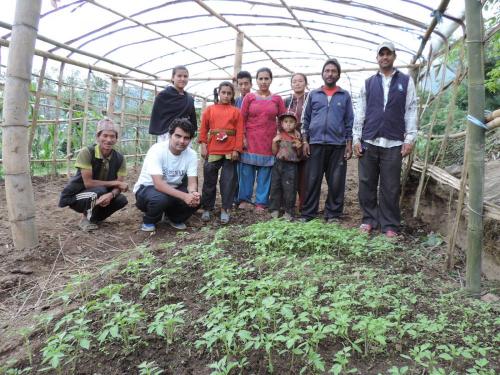
In Sundrawoti VDC, Dolakha, where I was visiting for monitoring purposes, the sweetness of Nepali people enveloped and held me. A group of staff from Nyayik Sansar and I had just finished inspecting a number of tomato tunnels. We then had sweet lemon tea and noodles on a rooftop overlooking green hills and puffy, white clouds. After this we went on to a community meeting where I used some rocks to explain how a value chain works.
The rain soon began as we were inspecting the tomato tunnel of Nanda, 34, and Bhagawati, 29, Regmi. The tunnel, like the others that we had inspected and like the Nepali people, was very strong with the infrastructure made out of thick pieces of bamboo. Nanda invited us into their kitchen as Bhagawati boiled water on top of a chulu making dudh chiya. Saraswati who at 14 is small for her age helped her mother to prepare the tea. Shiva, 6, sat next to his mom while the youngest Sarita, 3, entertained me by pulling multiple kirpani out of a knapsack, even smashing some, and then eating them. Nanda showed us his dhangro which he uses to “cure” people who are nervous and can’t sleep. Nanda’s mother was also in the cramped kitchen recounting her life story. The tea was served in metal cups and I was the only one who couldn’t hold this as it was too hot for my bideshi fingers. Although nobody else seemed bothered, as it started to monsoon we had to close the kitchen door causing smoke to irritate my eyes. After the rain stopped and we waved good-bye I took deep breaths trying to internally attach everything I had just experienced.
I had come to Sundrawoti for the third time in 2016, this time with Pradeep from Nyayik Sansar. The intent was for me to be able to see how the World Jewish Relief funded livelihood market focused project was moving forward. Nyayik Sansar is the local implementing partner having worked in this VDC prior to and directly after the 2015 earthquakes. Their focus had been on helping families to grow for nutritional purposes, providing youth and women’s empowerment opportunities and upgrading the skills of teachers. Nyayik Sansar is continuing to work with these various groups and are now also helping farmers to grow commercially, facilitating deeper connections to the various markets in the area.
I attended a number of community meetings with Nyayik Sansar staff discussing why it is vital to establish market systems and value chains. Overall community members were very enthusiastic about these ideas. This will hopefully lead to increasing people’s incomes resulting in being able to rebuild homes and having better access to health and educational opportunities. But the proof will come based upon quality production, establishing an agricultural cooperative and bringing product to collection points and markets.
It is vital that Nyayik Sansar is using sustainable modalities, i.e. value chains, for increasing income levels as they won’t be working in this VDC forever. However, the project targeted farmers and other community members must champion this and make it their own. But as one delves further into the community one can also see the various complicated issues that families face. These include caste disparities, children eloping, lower educational levels, a dearth of computers and lack of internet (although a shop with internet will soon be opening) and mostly men going abroad or to other parts of Nepal to work leaving women to do the farming and taking care of their children and their households.
There are however numerous possibilities. The community in which Nyayik Sansar is based, Katuachowr, has a dirt road, which is scheduled to be improved, with many buses and trucks passing through on their way to Sangati, Charikot and Kathmandu. There are a few hotels, restaurants and some shops. As Nyayik Sansar establishes a collection centre operated by an agricultural cooperative, this can have a huge impact through also running a retail shop, with traders and wholesalers coming to this site. Nyayik Sansar can help facilitate the development of Katuachowr through its integrated development approach. In the future based on production and participation by the wider community value added products, e.g. ginger candy and ketchup might also be produced, creating jobs and enabling families to further increase their incomes.
Another crop being grown as part of this project is ginger. After inspecting a number of fields all seemingly planted by and cared for by women, we were invited to have freshly picked cucumber dipped in noon krushani at one of the farmer’s homes. As we waved good-bye I once again breathed deeply.
On my last day in Katuachowr we held a meeting to choose people to participate in growing cauliflower. There were a number of women with small children, one of whom was 10 month old Bikash. We took to one another, he even peed all over my pants. As I hugged him good-bye he laid down on my shoulder as if I were a member of his family. In the evening I took a walk and laid down on some grass. An older husband and wife came over and we started chatting. They offered me kirpani and smiled. As I walked back to town I passed two young school girls. We greeted one another and they asked my name. One of the girls opened her backpack and took out some candy, telling me linu. My heart is so full from this visit and I can’t thank the people of Sundrawoti enough for just being who they are.










Add new comment